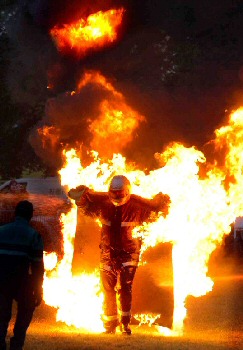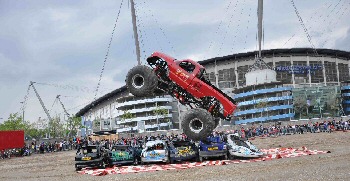|
The Extreme Stunt Show heads
back to Merseyside

THE fantastic Extreme Stunt Show who we
have featured many times, like back in October
2014, when they preformed at Southport's
Pleasureland are again revving up for a new season of high octane car crushing,
bike jumping action. The 1st dates so far include a stop in Liverpool!
The show will see the 1500 horsepower monster beasts, Lil' Devil and Extreme car
crushing to the max, plus Extreme BMX Team will once again take to the air to
battle it out!

The show will feature many other things from 2
wheel driving, fire stunts and just good old fashioned chaos to take you all the
way to the extreme edge.
The Extreme Stunt Show which will be performing on the following dates,
locations and times:-
► On Wednesday, 6 May 2015, from 7.30pm, in Wrexham, at the Stansty Lodge, on
Mold Road, LL1 4YF.
► On Friday, 8 May 2015, from
7.30pm, in Liverpool, at Stanley Park, on Priory Road, L4 2SL.
► On Saturday, 9 May 2015, in Wigan, at the DW Stadium, Loire Drive, WN5 0UZ,
from 6pm.
► On Tuesday, 12 May 2015, from 7.30pm at Chorley's Botany Bay (J8 M61) Canal
Mill, Botany Brow, PR6 9AF.
► On 13 May 2015, from 7:30pm, in Blackpool, at the Car Boot Site, Whyndyke
Farm, Preston New Rd, (J4 M55) FY4 4XQ.
Advance tickets (no booking fee)
► Adults:- £12
► Child/Concessions:- £6
(Children aged 3 to 15 Inclusive/Disabled/OAP)
Gate Tickets (on the Day)
► Adults:- £14
► Child/Concessions:- £7
(Children aged 3 to 15 Inclusive/Disabled/OAP)
Ticket Hotline:- 08444 771000. |
 |
Scientists
discover how easy voters' opinions are manipulated!
SCIENTISTS have found that the way people vote can depend on much more than
the issues being debated. Nick Chater, Professor of Behavioural Science at
Warwick Business School, revealed through a series of experiments how easily
people's voting intentions can be influenced. As the UK General Election
draws closer political parties of all colours are bombarding voters with
pledges, information and speeches, but on BBC Radio 4's 'The Human Zoo'
show on Wednesday, 8 April 2015, Professor Chater argues subtle
psychological effects could be just as effective. Professor Chater said:-
"Many of our decisions are surprisingly dependent on the context; they are
very momentary and are actually quite easy to push around and even change. We
have a jumble of different thoughts in our minds and that jumble gets resolved
when we are asked a question; such as which way you'd like to vote; but at
another moment, in a slightly different context, our thoughts may get resolved
in a different way. We are largely unaware of the capricious factors that drive
our decisions."
Professor Chater reveals several psychological devices that will influence which
way people will vote on 7 May 2015. The 1st persuades people to argue
against their own beliefs. A quick survey of members of the public asked if
spending on the NHS should be ring-fenced. Without them knowing their answers
were reversed; but instead of pointing out the mistake when the survey was
discussed, many argued for the point of view they think they just gave the
opposite view from what they actually chose. "This is known as
'choice blindness'. On many issues people are quite conflicted, so it is easy to
push them around. In our small experiment, one person was for ring fencing the
NHS, but when we reversed his answer, he accepted that this must be what he had
said and started arguing against ring-fencing. This has been repeated many times
in experiments and often people are very happy to defend an opinion they didn't
give before. When you explain what has happened to them people are bewildered.
In 1 experiment on choice blindness people were asked for their voting
intentions before and after their answers were changed. They found their voting
intentions changed after their argument had been shifted. A lot more people are
open to change than is thought, much larger than the usual 10% to 15% of swing
voters that is often quoted in the media." said Professor Chater.
Professor Chater also revealed that candidates' faces can be a powerful
influence on voting. "People were shown photos of the winners and
runners up in a US election. They were asked between the 2 who was the most
competent. People agreed on the image judged to be most competent and that was
mostly the winner in the election. It shows how quickly people make a judgement
and it is understandable, because during an election campaign we are bombarded
with so much information, our brains can't possibly process it all. Instead we
take shortcuts and judging competency by appearance is an understandable
shortcut." said Professor Chater.
A lot of facts and stats are thrown about during a campaign, but scientists have
found they have surprisingly little effect on voters.
People were asked if crime is on the increase. Some felt it was and even when
shown a graph from the British Crime Survey showing it has been in decline for
the last 20 years, some would not change their mind. Resistance to facts can be
quite extreme. Professor Chater added that:- "Scientists infiltrated
a cult that thought the world would end, but of course when it didn't instead of
changing their belief, the members thought their actions had saved the world,
and so they stepped up their efforts to recruit more members to the cult. Even
then facts don't change people's minds. It seems when we are in a social
environment where we have each other as support for our actions and attitudes
facts make little impact."
Another experiment showed how easily "primed" people can be in
their political thinking. Leaving a dead plant in a room and turning the heating
up made people more likely to feel that global warming was an important issue.
"We are more influenced by our own personal experiences and anecdotes than by
data. 1 study found in the US that the US flag, after 9/11, had become a strong
Republican cue, and when the flag was presented on a survey more people said
they would vote Republican. Experiments have even found that putting the voting
booth in a church as opposed to a school effects the way people vote. These
experiments show how easily our decision on who to vote for is pushed around,
much more than we realise." he concluded.
So let us know if you agree with this by emailing us to:-
news24@southportreporter.com.
Listen to:- 'The Human Zoo' election special on the BBC website by
clicking on
here.
|












